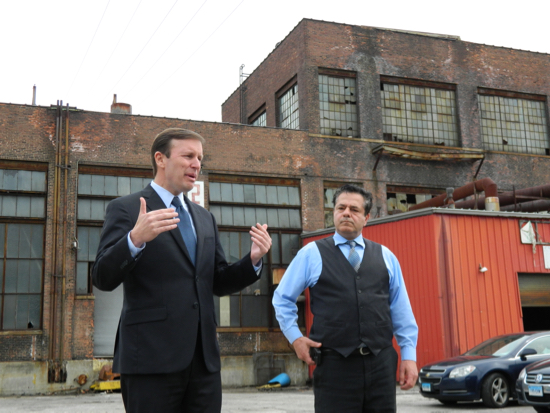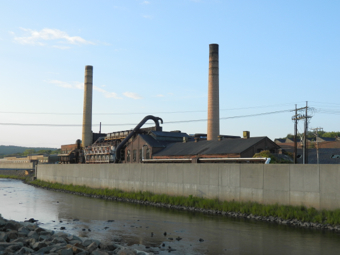 Healey Ford. Seymour Lumber. Derby Cellular Products.
Healey Ford. Seymour Lumber. Derby Cellular Products.
The lower Naugatuck Valley is dotted with contaminated “brownfield” properties where environmental issues related to their previous uses have thrown question marks over redevelopment plans, caused hiccups to demolition, or stalled projects altogether.
On Wednesday U.S. Senator Chris Murphy visited a similar site — the sprawling Ansonia Copper and Brass complex — to laud a new bill he says would help property owners and developers return such properties to productive reuse sooner.
The bill, the “CLEAN UP” Act — acronym for “Creating Livable Environments And New Usable Property” — would reauthorize two expired tax credits.
The first would allow a property owner or developer cleaning up a site to write off the entire cost of an environmental cleanup in the year it takes place.
Under current federal tax law, Murphy said such costs have to be spread out over the course of five years.
“That’s really important for developers of brownfields because there’s a lot of expense associated in the early cleanup stages,” Murphy said. “The ability to get an immediate tax benefit and the present value of that money can be the difference between getting into a project like this and staying out.”
The second tax credit would allow nonprofit developers to do cleanups more easily.
“For non-profit developers, often some of their development activities are taxable, even though much of their non-profit core activities are not taxable,” Murphy said. “I am proposing that for not-for-profit entities, their brownfield remediation work be tax-free as well.”
Murphy was also a guest Feb. 29 on “Valley Navel Gazing,” the Valley Indy’s weekly radio show, where he talked about the issue.
Click the play button below to listen. The brownfields discussion begins around the 20-minute mark.
Murphy, who has been touring old industrial properties in the Valley and communities throughout the state recently, pointed out the region’s proximity to Route 8 and the Waterbury branch rail line.
“Economic development directors up and down the Valley are regularly approached by companies that want to locate (here), but they can’t find a clean site to build,” Murphy said.
If a city could point to a brownfield site where a company could use the tax credit to clean it up, economic activity might get a boost.
The senator was joined by Mayor David Cassetti and several of the city’s Republican Aldermen at Wednesday’s photo op.
Ansonia Copper & Brass
The city reached a deal with Ansonia Copper & Brass in August 2014 in which the company agreed to demolish about 30,000 square feet of buildings and was allowed to deduct the cost of the work against an outstanding tax bill of roughly $800,000.
Demolition began in December 2014. The city and the company are in talks to extend the deal to other parts of the 42-acre complex in the heart of the city’s downtown.
The Valley Indy asked Cassetti if any developers have approached him about Ansonia Copper and Brass, or other properties in the city with environmental question marks.
 Not yet, the mayor said. But he said Murphy’s bill could “help tremendously.”
Not yet, the mayor said. But he said Murphy’s bill could “help tremendously.”
“I’m looking forward to working with the owner of the property and getting this cleaned up so we can open it up for developers to come in,” Cassetti said.
The property’s current owner, Ray McGee, said he’s working with the city on a deal to take down another 150,000 square feet or so of buildings.
He said the company needs to do more sampling on the property to determine what’s in the ground.
Contaminants discovered so far include oil that leaked into the ground from buried tanks, and metal oxides from metalworking done at the factory.
But no “real nasty stuff.”
Murphy pointed out McGee could take advantage of the tax credit — if it passes — but said the longterm future of the property will probably involve a private developer.
“We have to acknowledge that it’s ultimately going to be a private developer that’s going to come in and take on this project and put some real risk on the line for a big benefit,” the senator said. “We’ve got to help incentivize private developers to come and take on big projects like this.”
His comments echoed the sentiments of Rick Dunne, the executive director of the Naugatuck Valley Council of Governments.
Dunne said that typically, governments can help developers get grants to investigate environmental problems and develop plans to clean them up.
But then the developer has to put together financing to get from there to the cleanup to construction.
Even if they can get a low-cost government loan to do the cleanup, much of a developer’s money will still be tied up, Dunne said.
Being able to write off the cleanup costs immediately will help them get construction financing sooner.
“Having that tax credit available immediately in the first year, you can count that as a dollar in the deal as opposed to writing it off over several years,” he said. “It expands the number of deals that can be considered for the site. It really puts real money into it.”
Will This Pass?
Murphy’s bill would reauthorize the tax credits — which expired in 2009 and 2011 — and extend them to the end of 2019.
Rep. Elizabeth Esty of the state’s Fifth Congressional District has introduced a companion bill in the House of Representatives.
The lawmakers are confident they can get the tax credits reauthorized in the lame duck session after November’s elections.
“We know there has been bipartisan support for these proposals in the past because they were part of the tax laws up until about 2009,” Murphy said.
So, why did they expire in the first place?
“Neglect,” Murphy said. “My understanding is that it didn’t have a champion when it initially expired. That’s why I think it’s possible to put it back on the books. It didn’t expire because of opposition, it just expired because there wasn’t anybody at the time pushing for it to remain on the books.”
The senator said the bill he proposed isn’t a silver bullet that will fix brownfields overnight.
“We’re not suggesting that this bill is going to change the world,” Murphy said. “But it’s just another tool for developers that might be a little wary of coming in and taking on a project like this.”